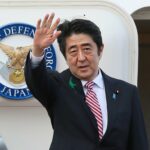
Citing a senior member of Abe’s Liberal Democratic Party, national broadcaster NHK said “former prime minister Abe died at a hospital in Kashihara city, Nara, where he was receiving medical treatment. He was 67.”
The death was also reported by other broadcasters as well as the Japanese news agencies Jiji and Kyodo.
The assassination of the country’s best-known politician comes despite Japan’s strict gun laws and with campaigning underway ahead of upper house elections on Sunday.
Here are the five things to know about the late Japanese former PM:
Family and early life
Shinzo Abe (21 September 1954 – 8 July 2022) was born in Tokyo to a prominent political family with significant economic influence throughout pre-war, wartime and post-war Japan. His mother is Yōko Abe and his father’s name is Shintarō Abe.
His family is originally from Yamaguchi Prefecture, and Abe’s registered residence (honseki chi) is Nagato, Yamaguchi.
Education
Abe attended Seikei Elementary School and Seikei Junior and Senior High School. He studied public administration and graduated with a bachelor’s degree in political science from Seikei University in 1977.
He later moved to the United States and studied public policy at the University of Southern California’s School of Policy, Planning, and Development (now the USC Price School of Public Policy) for three semesters.
Political life
The deceased was a Japanese politician who served as prime minister of Japan and President of the Liberal Democratic Party (LDP) from 2006 to 2007 and again from 2012 to 2020. He was the longest-serving prime minister in Japanese history. Abe also served as Chief Cabinet Secretary from 2005 to 2006 under Junichiro Koizumi and was briefly leader of the opposition in 2012.
Abe was elected to the House of Representatives in the 1993 election. He was appointed Chief Cabinet Secretary by Prime Minister Junichiro Koizumi in September 2005, before replacing him as prime minister and LDP president in September 2006. He was subsequently confirmed as prime minister by a special session of the National Diet, becoming Japan’s youngest post-war prime minister, and the first to have been born after World War II.
Abe resigned as prime minister just after one year in office, because of medical complications from ulcerative colitis, shortly after his party lost that year’s House of Councillors election. He was replaced by Yasuo Fukuda, who became the first in a series of five prime ministers who each failed to retain office for more than sixteen months.
After recovering from his illness, Abe staged an unexpected political comeback, defeating Shigeru Ishiba, the former defense minister, in a ballot to become LDP president for the second time in September 2012. Following the LDP’s landslide victory in the general election that December, he became the first former prime minister to return to the office since Shigeru Yoshida in 1948.
He led the LDP to two further landslides in the 2014 and 2017 elections, becoming Japan’s longest-serving prime minister. In August 2020, Abe announced his second resignation as prime minister, citing a significant resurgence of his ulcerative colitis. He tendered his resignation on 16 September, upon the Diet electing Chief Cabinet Secretary Yoshihide Suga as his successor.
Japan’s longest-serving minister
The late Abe was Japan’s longest-serving prime minister. He held office in 2006 for one year and again from 2012 to 2020 when he was forced to step down due to the debilitating bowel condition ulcerative colitis.
He is a hawkish conservative who pushed for the revision of Japan’s pacifist constitution to recognise the country’s military and has stayed a prominent political figure even after his resignation.
Assassination
Abe was assassinated on 8 July 2022 at around 11:30 am JST while delivering a campaign speech in Nara two days before the House of Councilors election.
He was reportedly in cardiopulmonary arrest and showed no vital signs immediately after the shooting. The Metropolitan Police arrested the alleged shooter, 41-year-old Yamagami Tetsuya, for attempted murder.
Abe is the sixth former Japanese prime minister to be assassinated.





